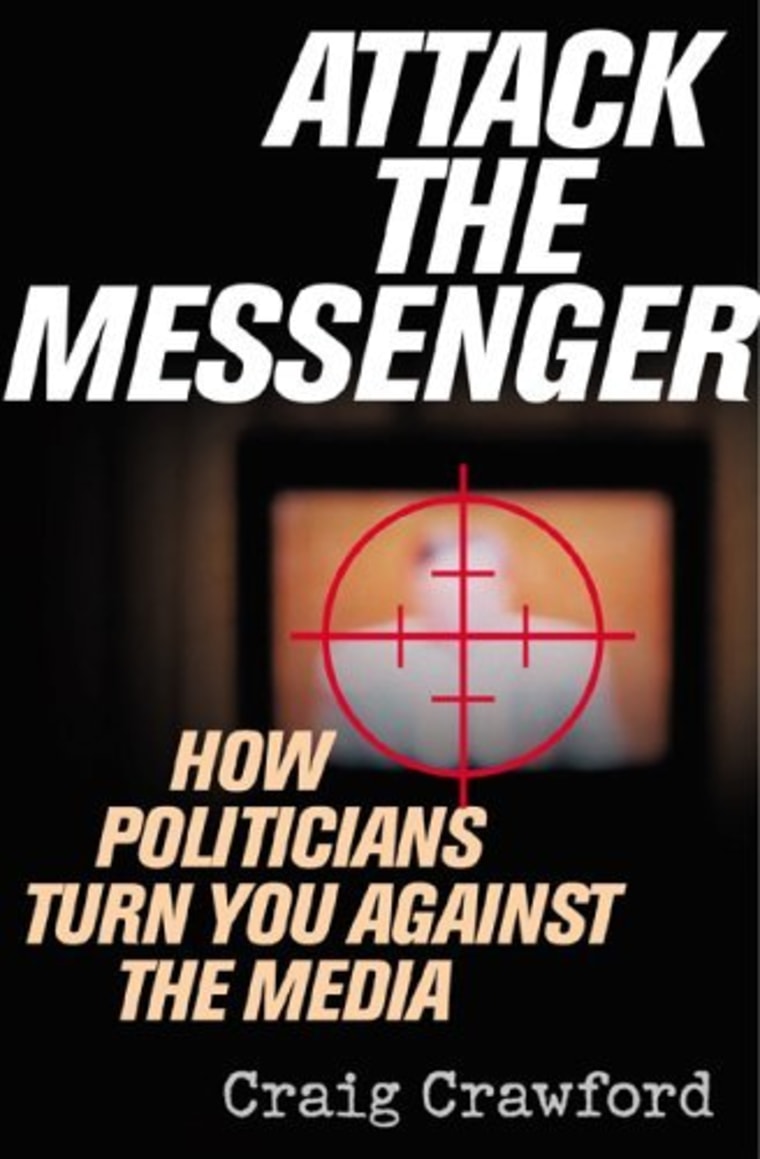Hardball friend and frequent guest Craig Crawford has just written a new book, 'Attack the Messenger: How Politicians Turn You Against the Media.' An excerpt of the book follows:
Chapter 2
Blame the Messsenger

Politicians won the war against the media with a simple rule: first, attack the messenger.
The modern era of American politicians subduing the media began in 1988 with the election of the first President Bush. He ran against the liberal-leaning base of the national media establishment and won.
Liberals also attack the media. Former Vermont Governor Howard Dean, a liberal Democrat, had this to say after losing his 2004 bid for the presidency: "The media is a failing institution in this country. They are not maintaining their responsibility to maintain democracy."
Dean's criticism is ironic. It was the media that made him famous. He rose to the top of the heap in the year before the 2004 Democratic primaries, thanks largely to the campaign press corp's fascination with his dark horse, Internet-based candidacy. He was even dubbed the frontrunner before a single vote was cast.
But it was also the media that knocked him down after his loss in the first voting contest, the Iowa caucuses in January 2004. The news media obsessed on the intensity of Dean's feisty concession speech on caucus night, intended to rally hundreds of disappointed but still enthusiastic supporters. The "Dean scream," as it was labeled, was roundly criticized as a sign that the energetic politician might be a bit loopy.
Dean never recovered from the moment. His trajectory is a cautionary tale for politicians who rely too much on so-called media momentum in campaigns. As the saying goes, "If you live by the tube, you die by the tube."
It is, therefore, not unusual that Dean ended up so bitter about the media's role. Politicians almost instinctively blame the media when things go wrong.
Attacking the messenger always finds a receptive audience.
It's human nature. When you don't want to believe something, what do you do? First, you blame the messenger.
If the doctor has bad news, get a second opinion. If your bank statement doesn't balance, maybe it's the bank's fault. If you get a bad grade in school, the teacher is out to get you.
Got a bad review at work? The boss just doesn't understand you.
Sometimes the messenger is wrong. But many times you eventually have no choice but to accept what you do not want to hear.
So it is with the news. If you don't like what you read on the front page of your newspaper, maybe the reporter is biased or just plain stupid. If the evening news on television doesn't please you, blame the messenger.
Consuming news with skepticism is a good thing. Plenty of reporting is biased, misinformed, and, yes, just plain stupid.
But these days, public distrust of the news media is at a dangerously high point. Our instincts to blame the messenger are confirmed again and again.
A New York Times reporter is fired for making up stories.
A USA Today reporter and several editors are fired for a series of plagiarism incidents over a number of years.
CBS News executives are forced to admit that 60 Minutes producers relied on a forged document to question a president's military service record.
Online news is no exception. Often, you can bet that if a story is only online, it's probably wrong.
We're still waiting for the pictures of George Bush dancing naked on a bar table. Years ago, Web newsies breathlessly reported we'd soon see them.
Sometimes, however, it is a story so hot or troubling that the mainstream media does not want to touch it.
Word of Bill Clinton's sexual affair in the White House first circulated on the Internet. Even when a major newsmagazine finally decided to run the story, it leaked onto the Web before it was published.
Thanks to the Internet and its Net-citizen journalists known as bloggers, anyone with a modem can spread lies or truth. It is often difficult to know the difference.
The old ways of journalism are long gone-and for good. There was a time when a handful of elites in New York City and Washington, D.C., set the news agenda.
A network news chief riding to work in his limousine would read the New York Times and take his cues for what would lead the evening news. A president or his top aides could call an influential reporter for a major newspaper and feed him a story that would drive the next day's news cycle.
As radio personality Don Imus once said of top news chiefs, "They write the news for their friends."
THE DOWNSIDE OF THE MEDIA'S FALL
But all is not good in the demise of professionals in the news business. That same reporter who got the president's scoop one day could just as easily turn around and raise important questions about a political leader's decisions that fostered positive change.
Despite their faults, those who once set the national news agenda were committed to telling the truth. Maybe it was the truth as they saw Blame the Messenger it, and sometimes they delivered it with a left-leaning bias. But they did not deliberately spread lies.
Whatever their faults, the old gatekeepers of real news are gone. They needed a head knocking, and they got it. But what's replaced them presents a challenge, if not a threat, to democracy.
While there is more news to consume, there is no longer a consensus for truth in the news media. The major news organizations are under siege. They've been replaced by an agenda-driven rabble of pseudojournalists on the Web and on cable news networks. There are few outlets anyone can trust to give unbiased information.
The role of the news media as an honest broker is shattered. The American people do not trust mainstream news sources anymore. Instead, they are drawn to sources that tell them what they want to hear.
In the 2004 presidential campaign, Internet bloggers on each side spread ridiculous lies about the opposing side's candidate. Hateful words and made-up stories filled the partisan websites. Rabid Democrats insisted that Bush and Cheney sent young Americans to their death in Iraq just to make money for Halliburton, the military services company that Cheney once ran. Equally rabid Republicans insisted that Kerry deliberately shot himself in Vietnam to win a war medal. The ideological zealots who spread such claims blamed media bias for any attempts by legitimate news outlets to debunk unfounded charges against either candidate. Supporters who believed the claims were primed to ignore mainstream reporting, instead putting their faith in baseless rumors spread on the Internet.
I know. I get their e-mail. Writing a campaign column during the 2004 campaign for Congressional Quarterly, I got plenty of hate mail from both sides any time I struggled to play referee in the war of words and gossip between Internet bloggers for President George Bush and Democratic nominee John Kerry.
After my column on Kerry's war record, a man in Florida wrote, "Go back to your liberal hole." A Kerry supporter didn't like my comments on television about Bush's skillful handling of relief to Florida hurricane victims. "How dare you get on national television and talk out your ass," she wrote.
I would not pretend that my own e-mail is all that telling, but over the years I have noticed a remarkable increase in the hateful tone of reader responses. As a reporter and columnist since 1985, I have always given readers a way to contact me, and I usually write back. The advent of e-mail made this much easier.
Even if the message to me is full of venomous insults, I try to write a courteous response. Generally, I find that when I respond to a hateful message, an amazing thing happens. The writer backs down. It is almost as if they suddenly realize that they are not corresponding with the headless beast they imagined when originally writing. They discover that a real person with feelings is on the other end.
"Thank you for your polite and kind response," a Kerry supporter in Massachusetts wrote after originally accusing me of being "stupid," "silly," and "drunk" in a column criticizing the Democrat's performance at his national convention. "I still disagree, but I apologize for the shrillness before."
Still, this woman's original attitude represents the way in which a growing number of Americans see the news media-as stupid, silly, or just plain drunk. Maybe we deserve such harsh language, but the coarsening of attitudes toward the news media has broken what should be a natural bond between journalists and citizens.
Reprinted with permission, an imprint of Rowman & Littlefield Publishing Group (USA).
